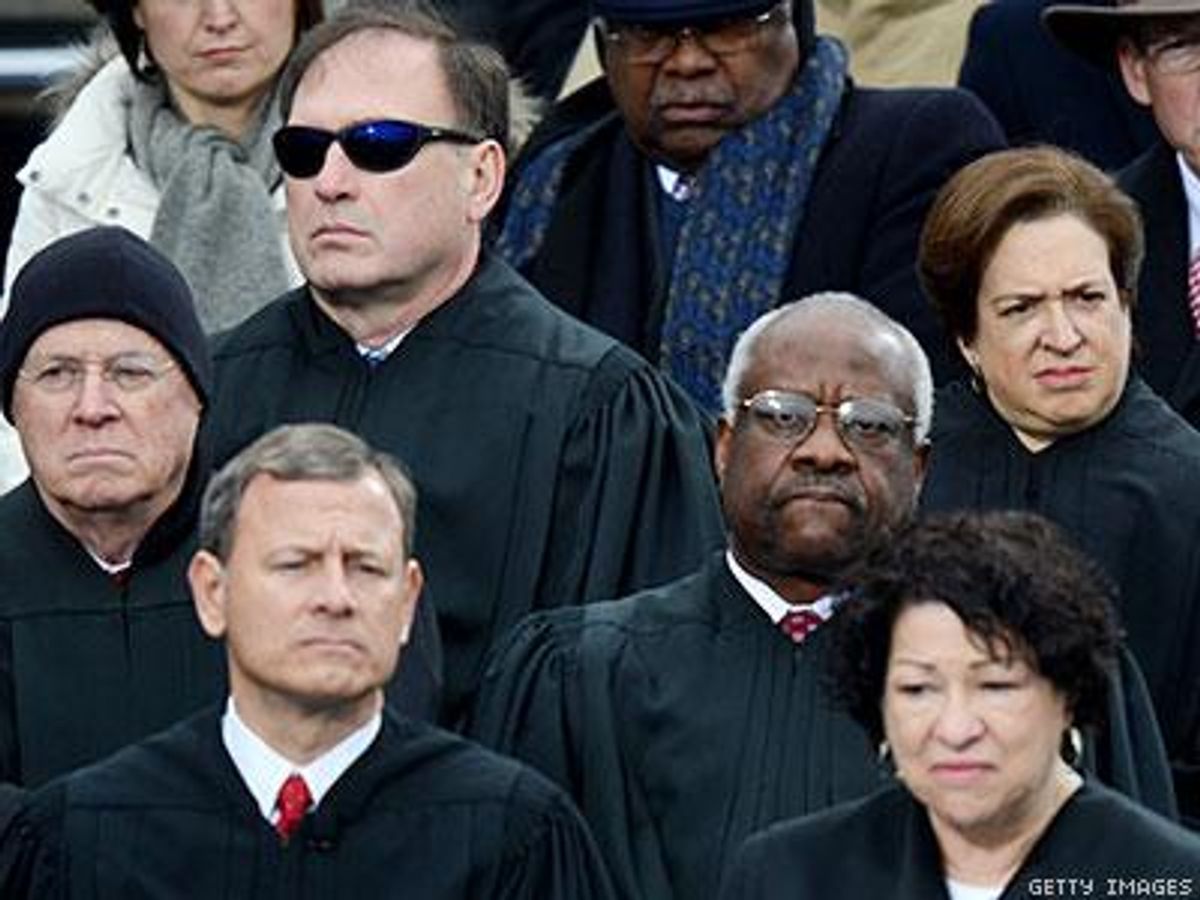It's impossible to predict exactly how the Supreme Court will rule on the marriage equality cases currently before it, but it's getting easier and easier to make a confident guess. Just ask Clarence Thomas.
Earlier this week, the court denied a request for a stay in Alabama, and Justice Clarence Thomas's dissent telegraphed a few key signals about the court's momentum toward equality. In addition, several recent court decisions all seem to indicate that the court already has a consensus that state bans on same-sex marriage are unconstitutional.
The Supreme Court didn't explain its reasoning for allowing marriage to begin in Alabama while the case is still pending. The extent of the ruling is the sentence, "The application for stay presented to Justice Thomas and by him referred to the Court is denied."
But in his brief dissent, Thomas expands on the decision and expresses frustration that he doesn't have enough support to delay marriage equality in Alabama.
Here are the key reasons Thomas lays out for why the court is unwilling to delay marriage equality, even though Thomas opposes that conclusion:
1. Weak Case from Antigay States
"Although a stay is not a matter of right, this practice reflects the particularly strong showing that States are often able to make in favor of such a stay," Thomas writes. "It is a rare case in which a State will be unable to make at least some showing of a likelihood of success on the merits."
In other words, Thomas indicates the other justices seem confident that Alabama would not be able to show that marriages would cause any harm.
2. Court's Approach Has Evolved
Thomas points to a few previous cases in which the Supreme Court did put marriages on pause: the Utah case, Kitchen v. Herbert, and the Virginia case, McQuigg v. Bostic. "It was thus no surprise when we granted a stay in similar circumstances a little over a year ago," Thomas writes.
But more recently, the court has turned down stay requests, allowing marriage to begin immediately in several states. Cases that saw stays denied by the high court include the Florida case, Armstrong v. Brenner; the South Carolina case Wilson v. Condon; and the Kansas case Moser v. Marie.
Despite the court's apparent trend toward allowing marriage equality to take effect, Thomas dismisses that fact as irrelevant. "That the Court more recently denied several stay applications in this context is of no moment," he writes.
3. Court Declined to Hear Cases in Which Bans Were Overturned...
Although it's only briefly mentioned in the dissent, the Supreme Court's refusal to hear pro-equality rulings is also worthy of note. Late in 2014, several states sent marriage cases to the Supreme Court, with the expectation that the justices would hear the cases. But the justices declined, effectively affirming the pro-equality rulings from lower courts.
In his dissent, Thomas notes that he would have wanted to review the pro-equality rulings, but was unable to muster enough support from his colleagues.
"Those denials followed this Court's decision in October not to review seven petitions seeking further review of lower court judgments invalidating state marriage laws," he writes. "Although I disagreed with the decisions to deny those applications ... I acknowledge that there was at least an argument that the October decision justified an inference that the Court would be less likely to grant a writ of certiorari to consider subsequent petitions."
4. ...But Accepted Cases in Which Bans Were Upheld
In fact, the Supreme Court only accepted subsequent marriage equality petitions after a lower court upheld marriage bans, creating what is known as a "circuit split."
"The Court has now granted a writ of certiorari to review these important issues and will do so by the end of the Term," Thomas writes, ending speculation that the court might delay a ruling until a subsequent term. He adds, "Alabama is thus in an even better position than the applicant to whom we granted a stay in [the Utah case]."
Clearly, that means that something has changed in the several months between the court's granting of the Utah stay and denying a stay in Alabama. It's impossible to say what happened, but it seems that a consensus may have emerged at the court behind the scenes, that a pro-equality ruling is inevitable.
5. Marriage Equality Is Becoming the Status Quo
The strongest justification that Thomas can muster for delaying marriage is to maintain the status quo.
"I respectfully dissent from the denial of this application," he writes. "I would have shown the people of Alabama the respect they deserve and preserved the status quo while the Court resolves this important constitutional question."
Usually the Supreme Court defers to status quo, upholding existing laws until they are fully reviewed. Going slow, maintaining consistency, and avoiding rapid changes in the law are high priorities for the court. The fact that the court allowed marriage to begin in Alabama, as well as several other states, could mean that the justices expect marriage equality to be the new status quo.
Ultimately Thomas seems as though he's readying to concede defeat. "This acquiescence may well be seen as a signal of the Court's intended resolution of that question," he says. Advocates who want to see the freedom to marry secured nationwide certainly hope Thomas's prediction is correct.












































































